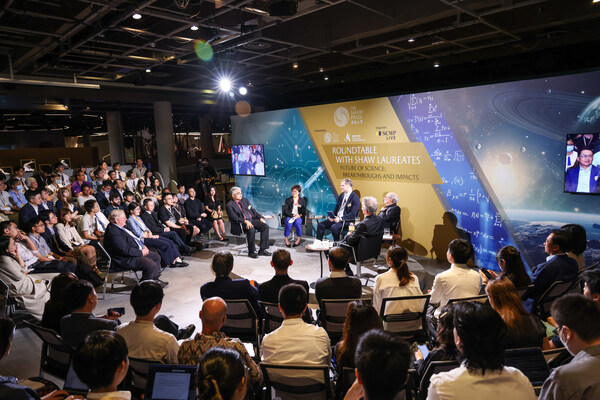Future of Science: Breakthroughs and Impacts
HONG KONG, Nov. 15, 2024 /PRNewswire/ -- The "Roundtable with Shaw Laureates ˇV Future of Science: Breakthroughs and Impacts", presented jointly by The Shaw Prize Foundation and the Hong Kong Science Museum, and organised by the South China Morning Post, was held on 14 November at the Hong Kong Science Museum. This gathering brought together four distinguished 2024 Shaw Laureates for a cross-disciplinary discussion on various aspects of scientific research, from interpersonal to international communication and collaboration, to the impact of AI on the entire scientific community and beyond. The roundtable attracted over 120 in-person participants, and hundreds of audiences online.

The ˇ§Roundtable with Shaw Laureates ˇV Future of Science: Breakthroughs and Impactsˇ¨ was held at the Hong Kong Science Museum on 14 November. Four 2024 Shaw Laureates engaged in a cross-disciplinary discussion.
Among the speakers were Shrinivas Kulkarni, Shaw Laureate in Astronomy 2024; Swee Lay Thein and Stuart Orkin, Shaw Laureates in Life Science and Medicine 2024; and Peter Sarnak, Shaw Laureate in Mathematical Sciences 2024.
A key focus of the conversation was the increasing role of emerging technologies, particularly AI, in science research. The speakers acknowledged the inevitability of AI's integration across all disciplines and emphasised the need for scientists to embrace this advancement. From a life science point of view, AI has the potential to accelerate drug development by replacing the traditional trial-and-error method. Students should be equipped with the technology, and be aware of what the tool can and cannot do. Mathematician Sarnak highlighted the importance of leveraging valuable resources such as international conferences, particularly those hosted in major cities like Hong Kong, to maximise the impact of AI in driving scientific breakthroughs through enhanced international collaboration.
While recognising the benefits of AI, concerns regarding the implications of this technology were also addressed during the roundtable. Speakers stressed the pivotal role of the understanding process in the pursuit of knowledge, emphasising that this process encapsulates the true essence of being a scientist ˇV an aspect that AI cannot replicate.
During the interactive session, speakers answered various questions from the audience, among which were many young researchers and scholars. Life scientists Orkin and Thein encouraged young scientists to pursue their own interests and commit to work that they strongly believe in. In contrast, Astronomer Kulkarni, who viewed science as a strategic endeavour, advised students to identify and maximise one's strengths and optimise resources effectively to achieve success in this "game" in science.

